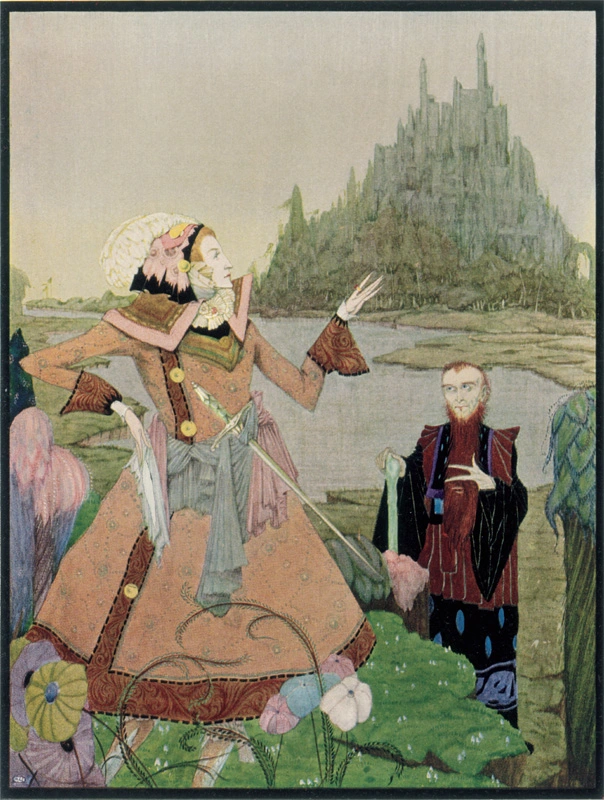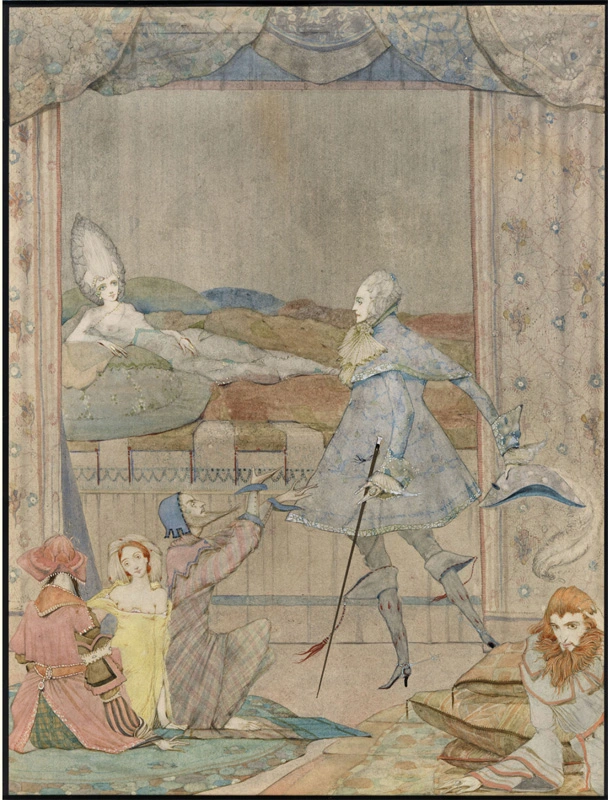There was a dreadful
silence and the image of death was everywhere. There was nothing to be seen but the stretched-out bodies of people and animals, all appearing to be dead. However, he soon saw from the red faces and
noses of the guards that they were just asleep, and their goblets, which still contained a few drops of wine, showed plainly that they had fallen asleep in their cups.

“THE PRINCE ENQUIRES OF THE AGED COUNTRYMAN”
The prince then crossed a courtyard paved with marble, went upstairs and came to a guardroom, where the guards were still standing in their ranks with their guns on their shoulders, snoring
loudly. After that he went through several rooms full of gentlemen and ladies, standing and sitting, and all asleep. Finally, he came to a room gilded with gold, where, on a bed with open curtains,
he saw the finest sight he had ever seen – a princess, who appeared to be about 15 or 16 years of age, with a bright, resplendent beauty that seemed almost to be divine. He approached her,
trembling and filled with admiration, and fell down on his knees before her. And now, since the enchantment was at an end, the princess awoke and looked at him with eyes full of tenderness.
“Is it you, my prince?” she asked. “You have taken a long time to come.”
The prince, charmed by her words, and even more so by the manner in which they were spoken, was unsure how to show his joy and gratitude. He assured the princess that he loved her better than he
loved himself. Although he was not very eloquent, this pleased the princess even more – not much eloquence, a great deal of love. He was more at a loss than she, and this is not to be
wondered at; she had had time to think about what to say to him, for it is very probable (although history is silent on the subject) that the good fairy had entertained her with pleasant dreams
during her long sleep. To cut a long story short, even when they had been talking for four hours they still had not said half of what they had to say.
In the meanwhile, the whole palace had woken up. Each was focused on their own situation, and as they were not all in love, they felt as if they were about to die of hunger. The chief
lady-in-waiting, being as hungry as the others, became very impatient and told the princess that supper was served. The prince helped the princess to get up – she was fully dressed, and very
magnificently, but he took care not to tell her that she was dressed like his great-grandmother, with a lace ruff peeping over a high collar, in spite of which she looked not a bit less beautiful
and charming.
They went into the great hall of mirrors, where they ate, and were served by the princess’s servants. The musicians played old tunes on violins and oboes, but very well, although it was
now over a hundred years since the instruments had been played. After supper, without losing any time, the lord almoner married them in the castle chapel, and the chief lady-in-waiting drew the bed
curtains. They had very little sleep – the princess had no need of it – and the prince left her the next morning to return to the city, where his father must have been anxious about
him. The prince told him that he had lost his way in the forest where he was hunting, and that he had slept at the cottage of a charcoal burner, who had given him cheese and brown bread to eat. The
king, who was easygoing by nature, believed him, but the queen could not be persuaded that his story was true. As the prince went hunting almost every day and always had some excuse ready when he
had stayed away for three or four nights at a time, she became convinced that he had a lover.
The prince lived with the princess for more than two years, and had two children with her, the eldest of whom was a daughter named Aurora, which means Dawn. The youngest child was a boy, who was
called Day, because he was even more handsome and beautiful than his sister.

“HE SAW, UPON A BED, THE FINEST SIGHT WAS EVER BEHELD” Photo © NGI
More than once the queen told her son, in order to persuade him to confide in her, that a young man must sow his wild oats, but he never dared trust her with his secret. Although he loved her,
he was afraid of her, because she belonged to the race of the ogres, and the king would never have married her had it not been for her vast riches. It was even whispered around the court that she
had ogre-ish inclinations, and that she found it very difficult to prevent herself falling on any little children passing by. And so the prince never uttered one word about the princess.
But when the king died about two years later, the prince became lord and master of his own kingdom and openly declared his marriage. He went to fetch his queen from her castle and they made a
great entry into the capital city, she riding between her two children.
Some time afterwards, the king went to make war on his neighbour, the Emperor Cantalabutte. He made his mother regent to rule in his absence, and earnestly asked her to look after his wife and
children. He was likely to be gone for the entire summer. As soon as he had departed, the queen mother sent her daughter-in-law and her children to a palace in the woods, so that she might more
easily satisfy her horrible longing.
A few days later the queen mother went to the palace and said to her chef, “I think I’ll eat little Aurora for my dinner tomorrow.”
“Oh, Madam!” cried the chef.
“It’s what I want,” replied the queen (and she said this in the tone of an ogress, who had a strong desire to eat fresh meat), “and I will eat her with a Sauce
Robert.” (This is a French sauce made with shredded onions cooked in butter, with vinegar, mustard, salt, pepper and wine.)
The poor man, knowing very well that he shouldn’t play tricks on ogresses, took his big knife and went to Aurora’s chamber. She was then four years old, and came up to him jumping
and laughing, ready to throw her arms around his neck and ask him for some sugar candy.
1 comment